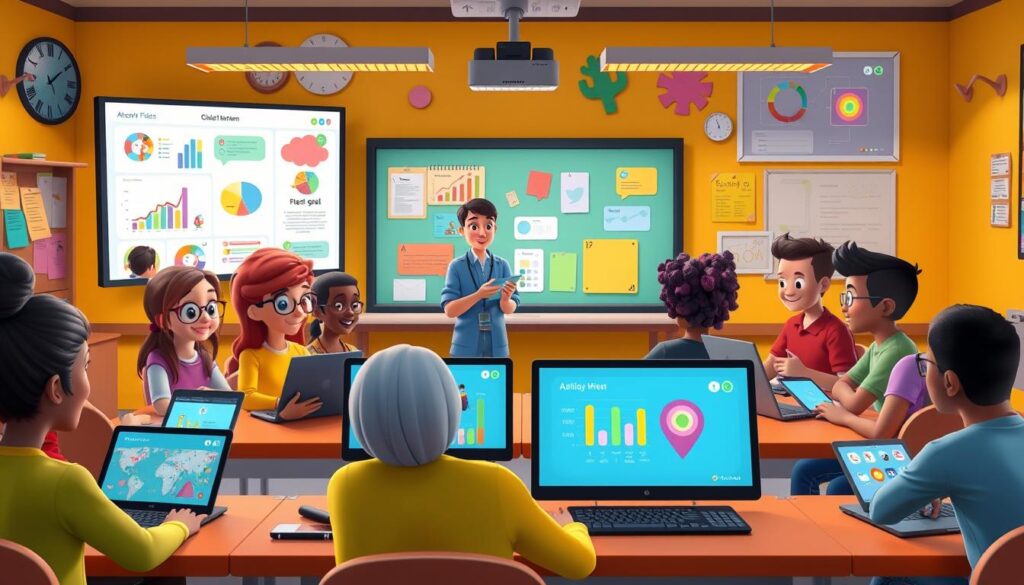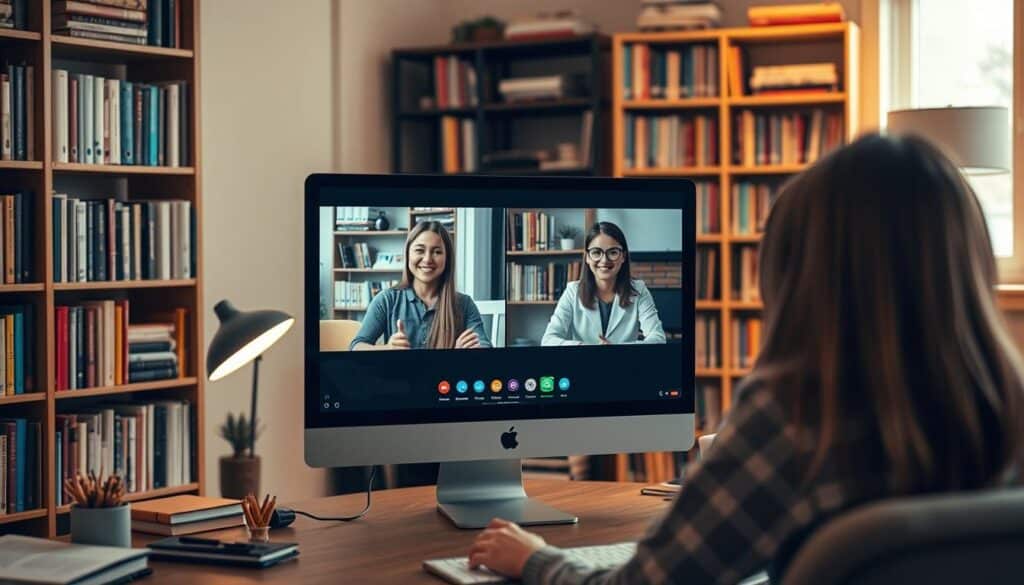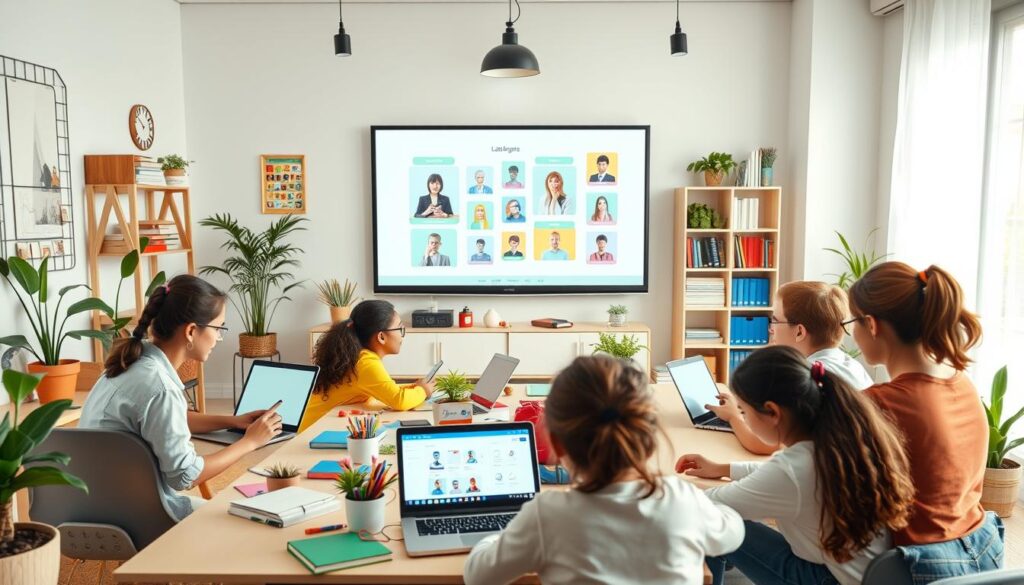Online tutoring has changed a lot, becoming a flexible and open space for learning. It has seen a huge 67% rise in demand for online learning tools in just one year. This shows how important online learning has become in today’s world.
For tutors to do well, they need the right tools and strategies. They must also keep the personal touch that makes learning successful. This is key for students to do well.
To make online tutoring work, you need to be ready and flexible. You should have good technology and use interactive tools. Building trust and clear communication with students is also vital.
Overcoming online learning challenges takes patience, creativity, and a focus on students’ growth. It’s all about helping them learn and grow.
Key Takeaways
- Online tutoring has seen a 67% increase in demand for online learning resources in the past year.
- 82% of students agree that a positive learning environment is crucial for their engagement in online tutoring sessions.
- Utilizing interactive tools and multimedia can increase student engagement by over 50%.
- Personalizing instruction and adapting to individual needs can boost student participation by 63% and academic achievement by 41%.
- Using engaging language and varied delivery techniques can lead to a 65% increase in student attention and participation.
Understanding the Fundamentals of Online Tutoring
Online education uses the internet to teach students virtually. As an online tutor, you need a few key things. These include a stable Wi-Fi connection, a laptop or tablet, and video conferencing software.
Defining Online Education
Online education has become very popular. It’s easy to access and flexible, making it great for students all over the world. It also offers personalized learning, meeting the needs of different students.
The Role of Technology in Tutoring
Technology is crucial for online tutoring. It creates an online classroom that feels like a real one. Using tools like an online whiteboard helps you show ideas clearly.
Having a good internet connection is vital for clear video and audio. Your devices must also work well with the needed software. Video conferencing software is important for talking to students in real time. Online tutoring platforms offer tools that make learning smooth.
Setting Up for Success

Creating a good lesson plan is key for a successful online tutoring session. It’s like a map that shows what you’ll cover, what materials you’ll use, and what activities you’ll do. By setting clear goals and choosing the right teaching methods, you help your students learn more and stay interested.
Crafting an Effective Lesson Plan
Start by setting clear goals for what you want your student to learn. Knowing what you want to achieve helps you pick the right materials and activities. This makes your teaching more focused and effective.
Then, make a list of what you’ll need, like textbooks, websites, or tutoring software. Make sure these resources are easy to find and work well with your online teaching setup.
Finally, plan engaging tasks and activities that match your lesson goals. These should challenge your student to use what they’ve learned in real ways. They also let you see how well they understand the material.
By tailoring your lesson plan to each student’s learning style and pace, you make your online tutoring more personal and effective.
“A well-constructed lesson plan is the key to delivering a polished and impactful online tutoring session.”
Strategies for Engaging Students

To be an effective online tutor, you need to engage students in a way that works for them. This means using strategies that fit their learning styles and what motivates them. By doing this, you can make learning fun and interactive, keeping students interested and eager to learn.
Visual learners do well with pictures, diagrams, and clear written materials. Using color-coded notes and mind maps can help them stay focused. Also, using slide presentations and annotating digital materials can make key concepts stand out.
Auditory learners, however, learn best by listening and speaking. Encouraging discussions and using mnemonic devices can really help them. Live audio chat and storytelling can also make learning more engaging for them.
| Learning Style | Engaging Strategies |
|---|---|
| Visual Learners |
|
| Auditory Learners |
|
By understanding and meeting the unique needs of your students, you can engage them better. This creates a learning space where everyone can participate and understand the material.
“Effective online tutoring requires a deep understanding of how students learn and the ability to adapt teaching methods accordingly.”
Adapting to Different Learning Styles

Online tutoring works best when you understand and meet different learning styles. By knowing what visual, auditory, and other learners need, you can make your sessions more engaging and effective.
Visual Learners
Visual learners do well with graphics, diagrams, and written material. Using color-coded notes, mind maps, and slide presentations can help them stay focused. Annotating digital resources and highlighting important points also helps them learn better.
Auditory Learners
Auditory learners love listening and speaking. Use discussions, mnemonic devices, and live audio chat to meet their needs. Storytelling is also a great way to make learning fun and memorable for them.
By changing how you teach to fit different learning styles, your online tutoring will be more effective. This way, you help your students learn better and succeed in school for a long time.
“Recognize that students may display a combination of learning preferences, and be prepared to adapt your approach accordingly.”
Improving Communication and Building Trust

Good communication and trust are key for a great online tutoring experience. Tutors use video chat to show they care and build trust with students. But, it’s important to have a strong internet connection to avoid any problems.
To look professional on video, tutors need to focus on lighting, attire, and audio quality. Good lighting and neat clothes make a great impression. Also, checking audio and video quality before the session helps avoid tech issues.
Using Video Chat and Email Effectively
Email is also a great way to improve communication and trust. Emails should be as professional as in-person talks. They help keep a record of what’s discussed, like assignments and feedback. Tutors should answer quickly and use simple, clear language.
Establishing Rules and Expectations
- Make clear rules for the session, like how to manage time and talk. This makes sure everyone knows what to do and keeps the learning space safe.
- Rules should include starting and ending on time, not interrupting, and asking to speak by raising a hand.
- Be clear about what you expect from students. When everyone knows what’s expected, you can build a strong and successful relationship.
- Talk about goals at the start. This makes sure everyone is working towards the same thing.
By focusing on good communication and trust, tutors can make a supportive and fun online learning space. This helps students do their best.
Online Tutoring: Enhancing Educational Content Delivery

To improve your online teaching, use many multimedia resources well. Feedback is key in learning. Mix up how you teach to keep students interested. Use YouTube videos to show concepts clearly. Add quizzes and polls to check if students get it.
Use infographics and slides to make info easy to understand. This helps students learn in their own way. A smart design with lots of integrations makes teaching easier and more fun.
- Leverage videos to visually demonstrate concepts and engage students.
- Incorporate interactive elements like quizzes and polls to assess comprehension in real-time.
- Utilize visual aids such as infographics and slides to present information in a more digestible and accessible format.
- Adopt an intelligent design platform with extensive integrations to create a collaborative, mobile–friendly workspace.
By using many resources and teaching in different ways, you can make online learning better. Students will learn more and enjoy it more.
“The best online tutoring sessions are those that seamlessly blend technology and pedagogy to create an immersive, personalized learning experience.”
Online tutoring is always available, so students can get help anytime. Big platforms match students with the right tutors. This helps bilingual students get the support they need.
Leveraging Interactive Elements
Interactive tools like quizzes and polls make learning fun and check if students understand. Tutors can see what students get and change their teaching. This makes learning better and more personal.
Harnessing Visual Aids
Visual tools like infographics and slides make hard info easy to get. They help summarize important points and break down tough ideas. This way, students learn better and remember more.
The Importance of Feedback

Feedback is key in online teaching. It helps students feel confident and learn better. Quick quizzes or polls after lessons give you insights into what they understand. This lets you adjust your teaching to meet their needs.
Have regular one-on-one sessions to talk about how they’re doing. Give feedback that is specific, actionable, and encouraging. It’s important to listen to your students too. This way, both you and your students can keep getting better.
| Type of Feedback | Description | Impact |
|---|---|---|
| Corrective Feedback | Identifies and corrects mistakes or misconceptions | Helps students improve their understanding and skills |
| Epistemic Feedback | Provides insights into the learning process and strategies | Enhances students’ self-regulation and metacognitive skills |
| Suggestive Feedback | Offers suggestions for improvement and future learning | Motivates students and guides their learning trajectory |
| Epistemic + Suggestive Feedback | Combines insights into the learning process with suggestions for improvement | Offers a comprehensive approach to enhance student learning |
Research shows immediate feedback is better than delayed. It helps students see how they’re doing. But too much feedback can stress them out and make them less interested in learning.
Online learning has its limits, but feedback is still crucial. It boosts motivation and helps students learn better. Feedback that is personal and specific is the most effective.
By giving timely, constructive, and personalized feedback, you can boost student confidence, guide their learning, and continuously improve your teaching methods. Feedback is essential for the success of online tutoring.
Also Read : Effective Strategies For Successful Virtual Training
Conclusion
As education changes, knowing how to teach online is key. Understanding the basics of online tutoring is essential. It helps tutors create a rich learning experience for students.
Online tutoring has seen a big rise, with many happy with the change. It offers personalized learning and is more affordable. This has made it popular with many.
Whether you’re new or experienced, learning online tutoring can be rewarding. It can change how you help students succeed. By keeping up with new tools and methods, you can make a big difference in your students’ education.
FAQs
Q: How can I get started with online tutoring services for math?
A: To get started with online tutoring services for math, you can find a tutor on various tutoring platforms like Varsity Tutors or Wyzant. Simply choose your subject, schedule a session, and select the format that works best for you, whether that’s one-on-one or in a group setting.
Q: What are the benefits of personalized tutoring for my child’s math homework?
A: Personalized tutoring can help your child succeed by tailoring the learning plan to their specific needs and learning style. This approach ensures that they receive the attention they need to master concepts and improve their grades in math.
Q: How do I choose the best tutoring platform for my needs?
A: To choose the best tutoring platform, consider factors such as the expertise of the teachers, the variety of subjects offered, flexibility in scheduling, and user reviews. Platforms like Varsity Tutors and tutor.com provide a range of options to connect with qualified educators.
Q: Can I find a math tutor who specializes in test prep?
A: Yes, many online tutoring platforms allow you to find a tutor who specializes in test prep for subjects like math. Look for tutors who have experience with specific exams, such as the ACT, SAT, or AP calculus, to ensure they can help your child prepare effectively.
Q: How can online tutoring sessions help students of different grade levels?
A: Online tutoring sessions cater to students of all grade levels by offering personalized instruction that aligns with their curriculum. Whether your child is in elementary school or preparing for varsity-level courses, a qualified tutor can adapt their teaching methods accordingly.
Q: Is it possible to connect with a tutor anywhere in the world?
A: Yes, one of the advantages of online tutoring is that you can connect with a tutor from anywhere in the world. This flexibility allows you to find a teacher who fits your specific needs, regardless of location.
Q: What should I expect during a virtual tutoring session?
A: During a virtual tutoring session, you can expect interactive lessons using various digital tools. Tutors will provide personalized feedback, assist with math homework, and help students unlock their full potential in a dynamic learning environment.
Q: How do I ensure my child’s success in a virtual math tutoring session?
A: To ensure your child’s success in a virtual math tutoring session, encourage them to be engaged and ask questions. Set up a quiet study area, and make sure they have the necessary technology to connect with their tutor seamlessly.
Q: What qualifications should I look for in a math tutor?
A: When looking for a math tutor, consider their educational background, certification, and experience in teaching the specific subject. A highly recommended tutor should also have proven success in helping students achieve better grades and confidence in math.
Source Links
- https://edrexlearning.medium.com/effective-strategies-for-engaging-students-in-live-online-tutoring-sessions-91fc4dd951db
- https://about.bramble.io/blog/33-tips-for-online-tutors.html
- https://www.linkedin.com/advice/1/what-key-steps-structuring-effective-online-tutoring-session-yvv7f
- https://tutorone.ca/the-ultimate-guide-to-online-tutoring/
- https://www.apextuitionaustralia.com/our-blog/comprehensive-guide-to-online-vs-in-person-tutoring
